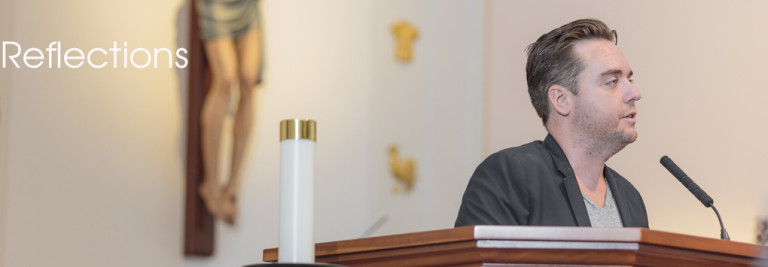Every weekday on my way to work in our Academy, I make a right turn down the block, and if I’m on time, I see a man walking the half a block or so to his city-bound bus. We can set our schedules to each other’s arrival—at least I know I do. I can tell if I’m late by where he is on his commute. Near the stop sign, I’m fine. If he’s at the bus stop, I’m in trouble. If I missed him, well, mark me tardy! About six weeks ago, for some reason unbeknownst to me, I inexplicably just waved at him and to my surprise he waved back. We’ve been waving to each other now since that day and this is someone I’ve never spoken to, I don’t know his name or what he does for a living. I recall the old slogan from my youth—Reach out and touch someone.
We are connected in countless of ways—quite literally, with Facebook reporting a couple of weeks ago “each person in the world is separated from every other by an average of three and a half other people” (New York Times, February 5, 2016). We are also connected by responsibility. Our need to serve one another is something I write about often, but we are also connected in less glamorous ways. At the beginning of our Lenten journey it is something perhaps worth thinking about. Our brokenness connects us.
This Sunday’s Gospel is about the universality of human weakness. I think Jesus is telling us in uneasy language ‘Don’t judge.’ Your pain is no better or worse than someone else’s. The corporate executive whose pride allowed him to ruin the retirement funds, the inane city official whose carelessness poisoned the water, the murderer, the liar are as guilty as we are when we refuse to love one another. Not every transgression is equal, of course, and the Church acknowledges that, but it is not our place to limit God’s love for others by saying these people deserve more forgiveness and these people deserve less forgiveness.
“Which way I fly is Hell; myself am Hell” (Paradise Lost, Book IV) Milton’s Satan says, suggesting that Hell is a condition, not so much a place. If you saw someone suffering from a terrible ailment, would we not offer words of love? If Milton is right, it means we don’t get to say “we are over here” and “you are over there.” We have to see people going through hell and pray for them. Everyone sins. Everyone requires forgiveness. We are not better than anyone else or wounded in some deep way more than anyone else—just differently.
I’ve made friends with people very different from me. It is something of which I am actually quite proud. I may not share their economic status, their political affiliation, belief system, cultural identity or even their citizenship, but everyone knows what it is like to suffer, to want perfection, to desire mercy. As people in addiction recovery know all too well, to share their own weakness is to offer help to the weak. Let us begin again and share our brokenness or at the very least, a friendly wave to a total stranger.
I’ll be seeing you,
Elliot



